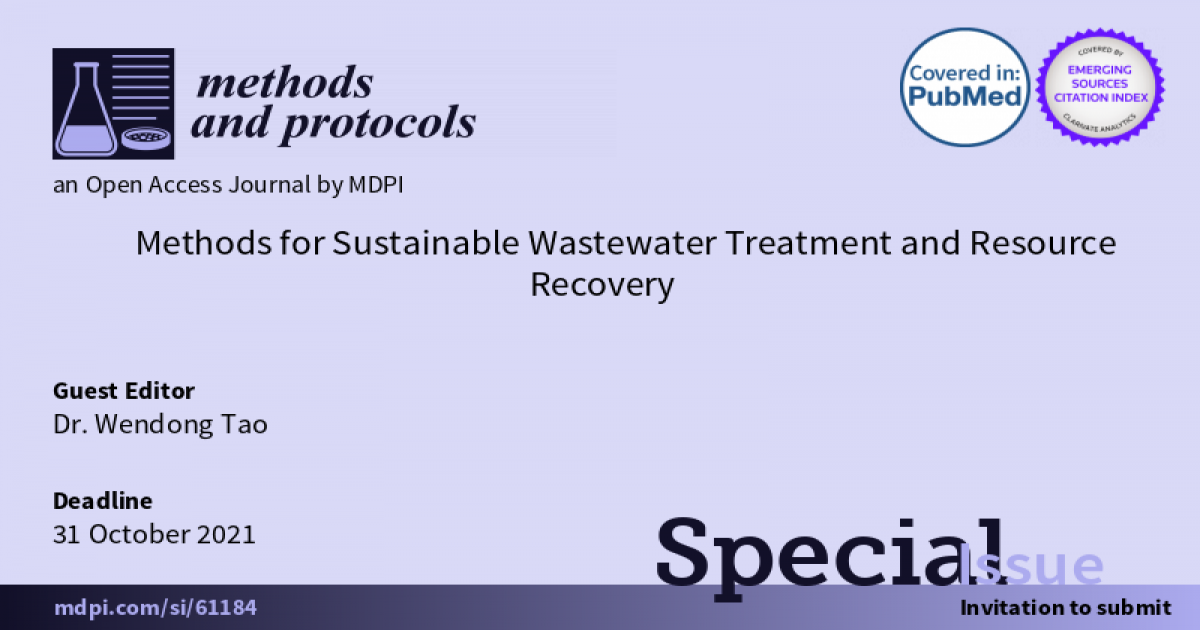Methods for Sustainable Wastewater Treatment and Resource Recovery
A special issue of Methods and Protocols (ISSN 2409-9279).
Deadline for manuscript submissions: closed (31 October 2021) | Viewed by 6032
Please contact the Guest Editor or the Section Managing Editor at ( ava.jiang@mdpi.com) for any queries.

Special Issue Editor
Interests: anaerobic digestion; ammonia recovery; struvite recovery; constructed wetland; autotrophic nitrogen removal; low-oxygen activated sludge process; wastewater microbial ecology
Special Issue Information
Dear Colleagues,
As substantial efforts are increasingly made by academia, practicing engineers, and the wastewater industry towards sustainable wastewater treatment and recovery of resources (energy, bio-based product, nutrient, and clean water) from liquid waste streams, MDPI's journal Methods and Protocols welcomes such contributions to a Special Issue on "Methods for Sustainable Wastewater Treatment and Resource Recovery". The paradigm shift from energy-intensive, pricy wastewater treatment towards energy-efficient, energy-positive, and ecosystem-based treatment, as well as resource recovery, has been achieved through a variety of creative methods and unit processes, innovative design and operation, and elucidation of treatment processes and kinetics. To promote industrial adoption of practical solutions and tackle grand challenges for sustainable wastewater treatment and resource recovery, this Special Issue encourages researchers and practitioners to submit review papers, original research articles, and novel case studies in, but not limited to, the following topics:
- Recovery of energy, nutrients, bio-based products, and clean water from liquid and solid waste streams related to wastewater treatment systems;
- Energy-efficient and natural wastewater treatment;
- Analysis and optimization of sustainable treatment processes using advanced analytical technologies and data mining approaches;
- Sustainability analysis of methods and systems.
Prof. Wendong Tao
Guest Editor
Manuscript Submission Information
Manuscripts should be submitted online at www.mdpi.com by registering and logging in to this website. Once you are registered, click here to go to the submission form. Manuscripts can be submitted until the deadline. All submissions that pass pre-check are peer-reviewed. Accepted papers will be published continuously in the journal (as soon as accepted) and will be listed together on the special issue website. Research articles, review articles as well as short communications are invited. For planned papers, a title and short abstract (about 250 words) can be sent to the Editorial Office for assessment.
Submitted manuscripts should not have been published previously, nor be under consideration for publication elsewhere (except conference proceedings papers). All manuscripts are thoroughly refereed through a single-blind peer-review process. A guide for authors and other relevant information for submission of manuscripts is available on the Instructions for Authors page. Methods and Protocols is an international peer-reviewed open access semimonthly journal published by MDPI.
Please visit the Instructions for Authors page before submitting a manuscript. The Article Processing Charge (APC) for publication in this open access journal is 1800 CHF (Swiss Francs). Submitted papers should be well formatted and use good English. Authors may use MDPI's English editing service prior to publication or during author revisions.
Keywords
- Anaerobic digestion
- Biorefinery
- Bioelectrochemical system
- Nutrient recovery
- Bio-based products
- Wastewater reclamation
- Ecological and natural wastewater treatment
- Constructed wetland and green infrastructure
- Energy-efficient wastewater treatment
- Life cycle analysis
- Techno-economic assessment
Benefits of Publishing in a Special Issue
- Ease of navigation: Grouping papers by topic helps scholars navigate broad scope journals more efficiently.
- Greater discoverability: Special Issues support the reach and impact of scientific research. Articles in Special Issues are more discoverable and cited more frequently.
- Expansion of research network: Special Issues facilitate connections among authors, fostering scientific collaborations.
- External promotion: Articles in Special Issues are often promoted through the journal's social media, increasing their visibility.
- Reprint: MDPI Books provides the opportunity to republish successful Special Issues in book format, both online and in print.
Further information on MDPI's Special Issue policies can be found here.






